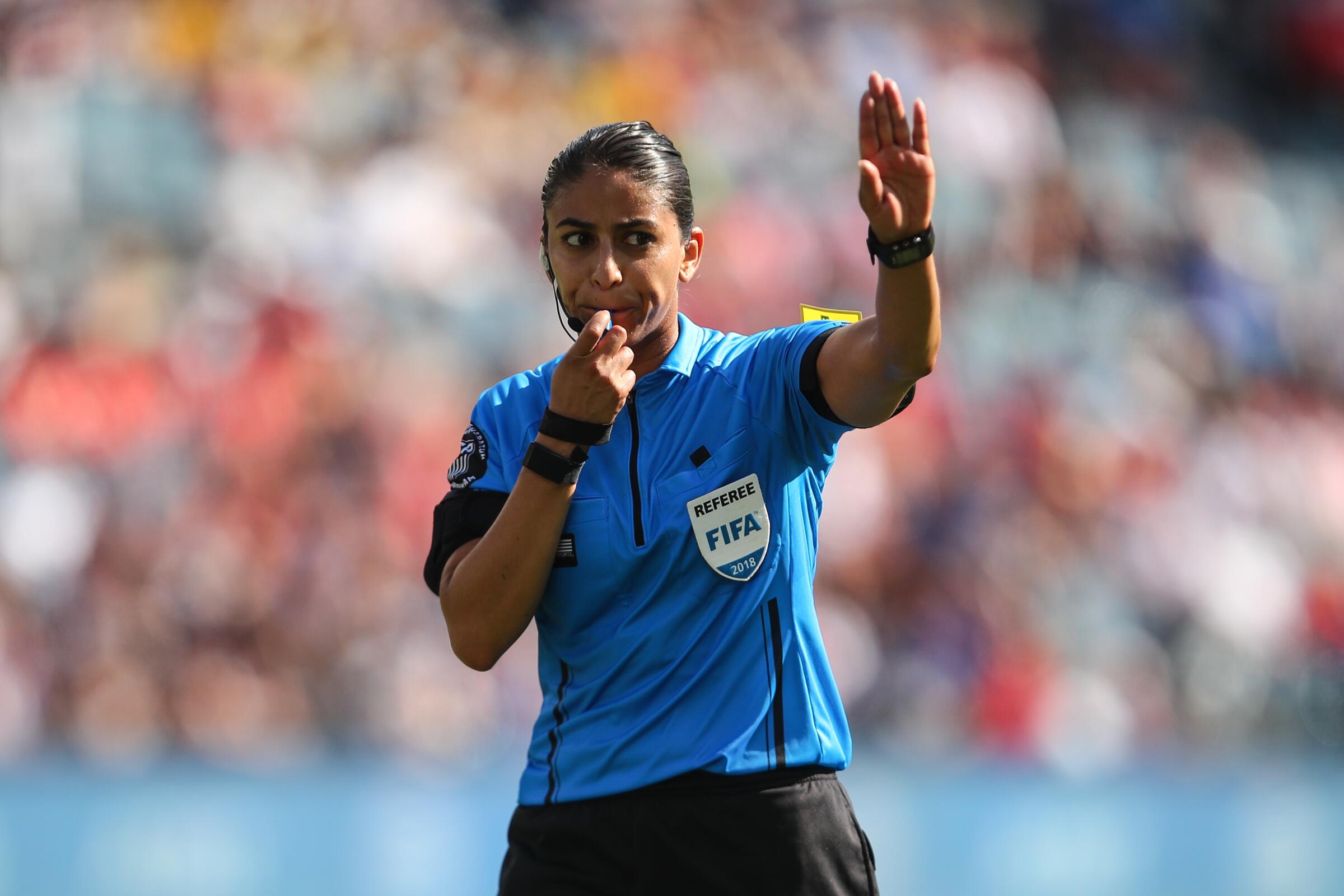Kevin Baxter writes about soccer and hockey for the Los Angeles Times. He has covered seven World Cups, five Olympic Games, six World Series and a Super Bowl and has contributed to three Pulitzer Prize-winning series at The Times and Miami Herald. An essay he wrote in fifth grade was voted best in the class. He has a cool dog.
- Share via
1
SARASOTA, Fla. — Every player who has played the game knows the sinking feeling that comes from seeing a referee stride purposefully toward you and reach into their pocket for a card. Will it be red or yellow?
In my case, it was plastic and of varied hues: Christina Unkel, a veteran FIFA official, insisted on paying for the coffee ahead of our hourlong chat last month, handing her credit card over the counter to the cashier.
That’s not exactly journalism etiquette but I wasn’t about to argue with a referee — especially one who is also a lawyer — since the two professions evoke fervor and fury.
“If you’re an official, you’re passionate about the game,” said Unkel, who is certainly that. “We wouldn’t be there for any other reason. Trust me, the verbal abuse, the toxicity in the referee world … it’s a zero-sum world to a certain extent.”
CONCACAF Champions League, Nations League and Gold Cup tournaments have created congested schedules and hardships for MLS players and teams.
Even a zero-sum job like officiating requires a certain amount of math though, and Unkel has made it her mission to explain how those problems are solved as a studio analyst, first with Fox Sports, where she covered 52 Women’s World Cup and CONCACAF Gold Cup matches in 30 days in summer 2019, then with ESPN and currently with CBS and Apple TV.
She took the job, she says, after becoming frustrated with broadcasters, many of them former players, who didn’t seem to understand the referees’ perspective — or even the rules of the game.
“TV analysts destroy referees. And like, actually, that’s the correct call, right?” she said.
“More often than not I usually can explain why we are correct or how we can get this better. Or why an official missed it.”
“She’s more than a rules analyst given that she was on the field for so long. She does bring a good perspective to the process, what the referees are looking at or what they’re thinking.”
— Mark Geiger, director of the Professional Referees Organization, on what Christina Unkel brings to broadcasts
That ability to break down calls, interpret the rules and explain everything clearly from a referee’s viewpoint has made the sport more accessible to tens of thousands of viewers. And if anyone questioned her ability to call ‘em as she saw ‘em, those doubts were erased in one of her first appearances on an MLS broadcast when she had a different opinion on a call than the center referee had.
That referee was her husband, Ted.
“I was like, ‘Oh my god, I just said on national TV that he got it wrong,’ ” Christina Unkel recalled without apology.
“Facts are facts,” she continued. “I’m the worst person to play soccer with because if the ball goes out, I’m, ‘Oh, it’s their ball.’ My brain just functions in a really annoying way where I see things in a very neutral perspective, even if it works against me.”
The Unkels are still married, by the way, but neither has changed their mind on the call.
“I think it’s a red card. He thinks it’s a yellow card. But it’s still my opinion, right?” Christina Unkel asked with a shrug. “The [calls] that people generally argue and debate about are gray areas where there’s facts and considerations that work for either side. It’s just where does the scale tip, the 51-49 tip, to make a decision one way or the other?
“And that’s the preferred decision even if you don’t agree with it.”

Christina Unkel, far left, stands next to Apple TV+ MLS 360 studio hosts Liam McHugh, Sacha Kljestan, Kaylyn Kyle and Bradley Wright-Phillips.
(MLS)
That’s the point Unkel strives to get across during her TV appearances: There’s always a preferred decision, even if you don’t agree with it.
“For me, it’s like when I break down a play, [it’s] ‘Oh, you’re criticizing,’ ” she said. “No, no, no. I’m educating the rest of the football community as to the decision and how they came to the decision, whether it was right or wrong, how is that they interpreted it.”
Mark Geiger, a two-time World Cup official and now director of the Professional Referees Organization (PRO), which oversees referees in the U.S. and Canada, said the context Unkel brings to soccer broadcasts is invaluable.
“She’s more than a rules analyst given that she was on the field for so long,” he said. “She does bring a good perspective to the process, what the referees are looking at or what they’re thinking. I really like this side of things. It really puts things into proper context.”
And though the new gig might not have the tension and pressure of the old one, it’s not without its challenges, especially when it comes to travel. Although Unkel has a simple makeshift studio in her Sarasota home, the Apple TV assignment requires her to take an early-morning flight to New York on the 32 Saturdays during the MLS season. After spending 12 or more hours on a TV set in Harlem, she catches a few hours of sleep before grabbing the first flight back to Florida.
The daughter of Central American immigrants, Unkel, 36, found her way into officiating by being critical of the referees in her South Florida youth league. The coach of her U-10 team, who was a referee and referee assessor, scolded Unkel for yelling at the officials and told her she should at least take a class to learn the rules first.
She did, and at age 10 became a certified referee. At about the same time she also decided she wanted to become a lawyer even though, she remembers, she wasn’t quite sure what a lawyer did.
The 23-player USWNT roster for the World Cup announced on Wednesday which included Alyssa Thompson, Megan Rapinoe and Alex Morgan.
She quickly found the two pursuits are compatible.
“The refereeing side actually helped me because when I entered in litigation, I saw that people were very emotional as attorneys,” Unkel said. “And I’m like, ‘Why are you so emotional? It’s not your problem necessarily. The clients committed the actions. It’s a matter of us deciphering the facts, and then figuring out if we can come to a resolution.’
“I brought that from soccer.”
Even while playing soccer in college, Unkel continued to climb the ladder as an official, being chosen to work a nationally televised friendly between the U.S. and Canada at age 23. Two years later she received her FIFA badge — the highest certification a soccer official can get — allowing her to work two CONCACAF youth championships, multiple tournaments in Central America and the Caribbean and more than 20 international friendlies.
After suffering a severe knee injury and starting a family in 2015 — she and Ted have a 7-year-old daughter, Quinn — Unkel moved to the VAR booth where, as one of the first women trained in video review, she officiated MLS games. She now used those skills on TV broadcasts, though she doesn’t consider herself retired from officiating. She still does college games and serves as the state referee administrator for Florida, leaving her in charge of the development, certification and education of all referees in the state. Two years ago, she was inducted into the Florida State Referees’ Committee Hall of Fame.
Through it all, she’s remained a passionate and outspoken advocate for soccer officials, whether she’s preaching that gospel on TV or in a quaint coffee shop in a strip mall near her home. The sport, she insists, couldn’t exist without them.
“I’m a big believer that soccer, in essence, is a chair made up of four legs,” she said. “It’s the players, the coaches, the fans and it’s the referees. And if you’re missing one of them, you don’t have a game.”
⚽ You have read the latest installment of On Soccer with Kevin Baxter. The weekly column takes you behind the scenes and shines a spotlight on unique stories. Listen to Baxter on this week’s episode of the Corner of the Galaxy podcast.









